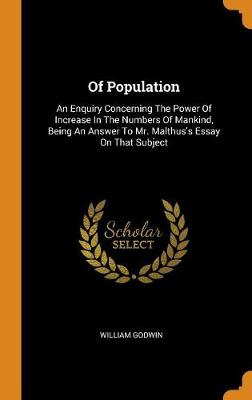Cambridge Library Collection - British and Irish History, General
1 total work
Novelist, journalist and founder of philosophical anarchism, William Godwin (1756-1836) believed in the innate goodness of humanity and the possibility of eradicating poverty through the contributions of all to an equal society. His most influential work, An Enquiry Concerning Political Justice (1793), suggested that the spread of knowledge and understanding would make government, which he regarded as oppressive and corrupting, redundant. In his 1798 Essay on the Principle of Population (also reissued in this series) Thomas Malthus had argued strongly against such utopian ideals, criticising Godwin in particular. Published in 1820, this is Godwin's belated response to these and subsequent criticisms. He questions the accuracy of Malthus' predictions, suggesting that the amelioration of poverty could lead to a reduction in population growth, and that improved food production would provide for increased populations. Godwin's views influenced the Chartists and later popular labour movements.
